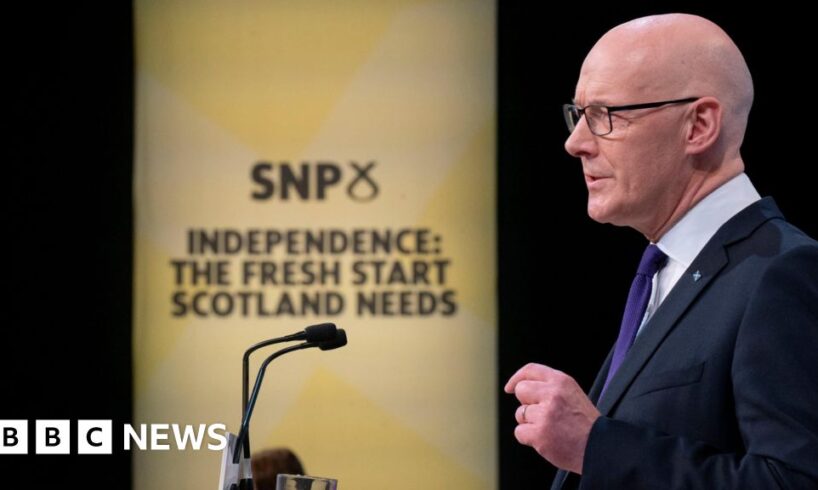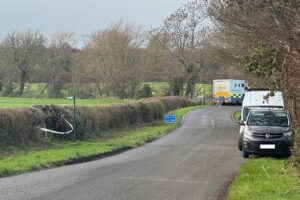
Glenn CampbellScotland political editor
PA Media
John Swinney addressed the party’s annual conference in Aberdeen
Independence is back – not that it is ever far from mind for the party that exists to bring it about.
John Swinney has settled the SNP’s strategy for trying to dismantle UK government resistance to another referendum.
He won a key vote at conference on Saturday which rejected a plan to use the Holyrood election as a substitute referendum.
He persuaded the conference to support his plan to focus on trying to repeat the circumstances that secured the original referendum – an outright majority of SNP MSPs.
That is an extremely difficult but clearly not an impossible thing to achieve under a partially proportional electoral system that is designed to prevent any one party from dominating.
So can this be achieved by an SNP that opinion polls suggest is far less popular than it was in 2021, never mind at the heights of its Holyrood majority in 2011?
PA Media
SNP members supported the first minister’s referendum strategy
A potential pathway is opened up by a more fragmented unionist opposition, with the emergent Reform UK drawing support away from other parties – not least the Conservatives and Labour.
Even if the SNP only has a 35% vote share in any given constituency that could well be enough to win if the other 65% is split multiple ways.
However, to increase the chances of SNP success the party is seeking to rebuild the broader coalition of independence-supporting voters it has attracted in the past.
That is why you will hear the independence argument threaded through the SNP’s election campaign.
A good proportion of lapsed SNP voters will have switched to Labour at last year’s UK general election.
Their support for independence may be soft. Achieving Scottish statehood may be well down their list of priorities.
One recent survey suggested that for most voters their top tier concerns are the NHS and the cost of living.
Swinney and his team know that, which is why there is persistent emphasis on some of the things the SNP has done in government over the years to address these issues.
Free prescriptions are an obvious example from the party’s earliest days in office.
The list now includes free university tuition, the expansion of free nursery places and the removal of peak rail fares.
These things are now banked by the public and voters will want to know what the SNP (and indeed all parties) are offering over the next five years.
That is why Swinney used his conference speech to set out new policy on the NHS designed to tackle the so-called 8am rush to secure an on the day GP appointment.
He has committed the SNP to a nationwide network of walk-in GP services which will be open seven days a week – and beyond office hours.
The UK budget in November will set the context for manifesto commitments and the indications are that Chancellor Rachel Reeves is operating in a very tight spending environment.
From last year’s budget, which included a substantial uplift in cash for the Scottish government, we know that her intention is to maintain that level of devolved spending with any further increases flattening out.
Reuters
Rachel Reeves will announce details of her budget in November
The SNP believe that prospect, and the expectation of further UK tax rises, will limit Scottish Labour’s ability to recover its electoral position over the next seven months.
Labour desperately needs to show progress to be considered as a serious alternative to the SNP.
They hope that their fortunes will improve as the May election draws nearer and the focus on devolved Scottish public services becomes more acute.
The SNP’s political opponents – including the Conservatives, Labour and the Liberal Democrats – see talk of independence as a distraction from the day-to-day business of delivery on health, education and law and order.
The SNP hopes the goal of independence can unite and motivate its activists to campaign, can motivate its membership to turnout to vote, and can motivate lapsed supporters to return to the party.
If that works, a fifth term in power at Holyrood is in prospect – even if the SNP falls short of the outright majority that led to the 2014 vote on independence.
And that, they hope, can overcome UK opposition and secure a second referendum.





